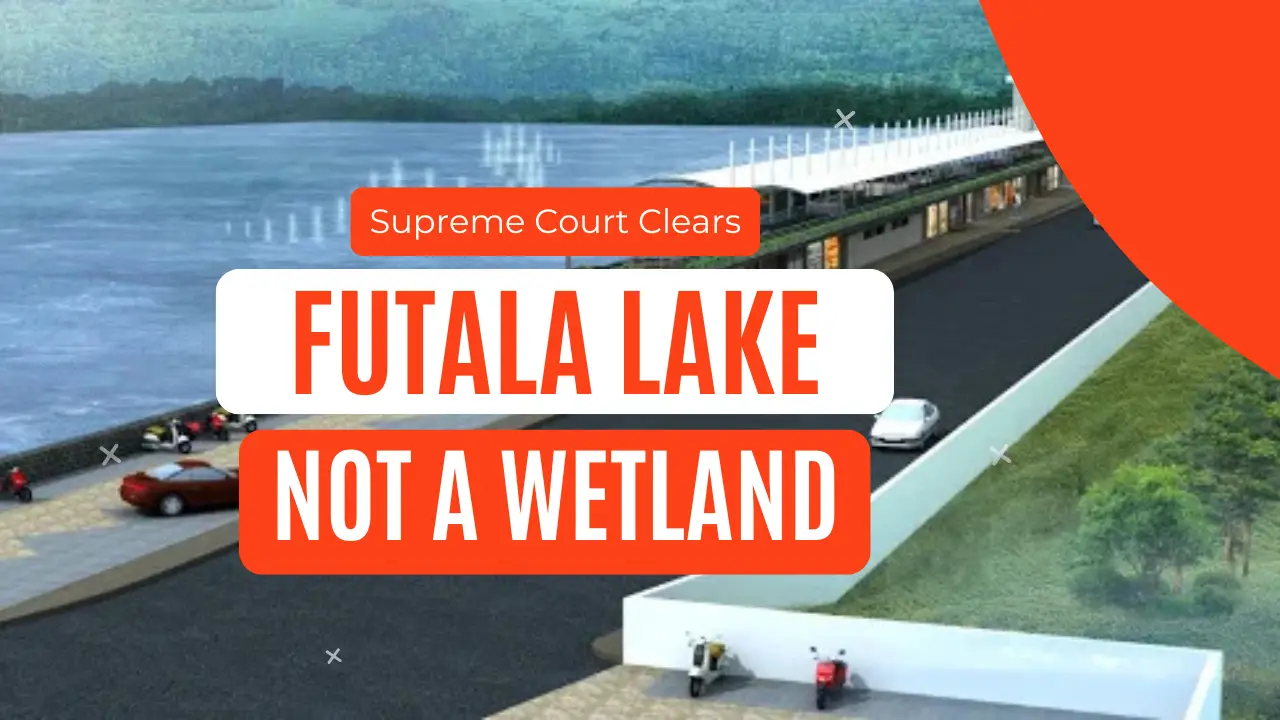Introduction
Nagpur’s most loved landmark, Futala Lake, has once again made headlines — this time for a Supreme Court verdict that could change its future forever. The apex court has ruled that Futala Lake is not a wetland, thereby permitting construction and development in its surrounding areas.
This landmark judgment clears the way for ongoing and upcoming projects like floating restaurants, musical fountains, and viewing galleries — all designed to turn Futala into a world-class urban leisure destination. However, the decision has also sparked debate among environmentalists and citizens who worry about the ecological consequences.
Futala Lake: The Heart of Nagpur
Futala Lake is more than a scenic spot — it’s part of Nagpur’s identity. Spread over nearly 60 acres, the man-made lake was originally built hundreds of years ago as a water reservoir. Today, it attracts thousands of visitors daily, especially during evenings when colorful fountains and street food stalls light up the area.
Over the past decade, local authorities have invested heavily in beautification projects to make Futala a major tourist attraction. Walkways, lighting systems, landscaped gardens, and a musical fountain show have all added to its charm.
The Legal Journey
The development around Futala Lake faced legal hurdles after environmental activists claimed that the lake qualified as a wetland and should therefore be protected under environmental laws. They argued that any form of construction or modification near it could disrupt the natural ecosystem.
The Bombay High Court, however, ruled that Futala Lake was man-made and not a natural wetland. This interpretation was later upheld by the Supreme Court, which confirmed that since the lake was artificially created, it does not fall under the “wetland” category defined by environmental protection rules.
This verdict effectively allows the state government and municipal authorities to proceed with construction and tourism-oriented projects around the lake.
What the Supreme Court Verdict Means
- Construction Can Resume:
Projects like floating restaurants, viewing decks, and cultural zones that were previously halted due to litigation can now move forward. - Tourism Boost:
The ruling is expected to accelerate Nagpur’s growth as a tourist destination. A developed lakefront with food courts, light shows, and entertainment spaces could make Futala a centerpiece for city tourism. - Responsibility on Authorities:
The Court also emphasized that though Futala is not a wetland, it must still be protected and maintained responsibly. Authorities must ensure that construction does not pollute or degrade the lake ecosystem.
Development vs. Environment: A Delicate Balance
While the verdict promises progress and urban beautification, environmental experts have raised valid concerns. Pollution, sewage inflow, and waste disposal continue to threaten the lake’s water quality. Uncontrolled development could worsen these problems if not managed carefully.
Reports indicate that untreated sewage from nearby houses flows directly into the lake — an issue that needs urgent attention. Without proper waste management systems, any beautification project could quickly lose its charm.
Therefore, the challenge for city planners will be balancing development with sustainability. Infrastructure projects should include sewage treatment, green belts, and ecological buffer zones to protect the lake’s natural character.
What Needs to Be Done
To ensure Futala Lake remains both beautiful and healthy, authorities should focus on:
- Sewage Treatment: Stopping all direct discharge into the lake through proper sewage management.
- Eco-Friendly Design: Using sustainable materials and eco-sensitive construction techniques.
- Regular Maintenance: Keeping fountains, lighting, and public spaces functional and clean.
- Public Participation: Encouraging citizen involvement in lake-cleaning drives and awareness campaigns.
- Water Quality Monitoring: Conducting periodic tests to maintain safe and clean water conditions.
Public Reaction
The verdict has divided public opinion. Many residents and business owners welcome it, seeing new opportunities for jobs and tourism. They believe Futala’s transformation can put Nagpur on the national tourism map.
However, environmental activists continue to urge caution. They emphasize that the lake should not turn into a commercial zone at the cost of its ecological health. The key, they say, lies in responsible development — growth that enhances Futala’s beauty without destroying its balance.
Conclusion
The Supreme Court’s decision declaring Futala Lake as not a wetland marks a new chapter in Nagpur’s urban development. The lake’s transformation could make it one of India’s most attractive public spaces, but only if handled with care.
Development must go hand-in-hand with conservation. Futala is not just a water body — it’s a symbol of Nagpur’s heritage, culture, and community spirit. If authorities, citizens, and environmentalists work together, Futala can truly become the pride of Nagpur — a shining example of how modern cities can grow without losing their natural soul.





